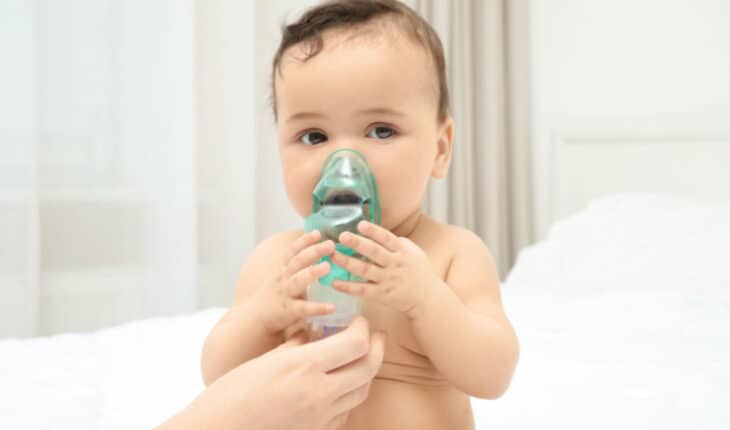Having a food allergy as a baby is linked to asthma and reduced lung function later in childhood, according to a world first study.
The research, led by Murdoch Children’s Research Institute and published in the Lancet Child & Adolescent Health, found that early life food allergy was associated with an increased risk of both asthma and reduced lung growth at six years of age.
Murdoch Children’s Associate Professor Rachel Peters said this was the first study to examine the relationship between challenge-confirmed food allergy in infancy and asthma and poorer lung health later in childhood.
The Melbourne research involved 5276 infants from the HealthNuts study, who underwent skin prick testing to common food allergens, including peanut and egg and oral food challenges to test for food allergy. At six years, children were followed up with further food allergy and lung function tests.
The study found by six years of age, 13.7 per cent reported a diagnosis of asthma. Babies with a food allergy were almost four times more likely to develop asthma at six years of age, compared to children without a food allergy. The impact was greatest in children whose food allergy persisted to age six as opposed to those who had outgrown their allergy. Children with a food allergy were also more likely to have reduced lung function.
Associate Professor Peters said food allergy in infancy, whether it resolved or not, was linked to poorer respiratory outcomes in children.
“This association is concerning given reduced lung growth in childhood is associated with health problems in adulthood including respiratory and heart conditions,” she said.
“Lung development is related to a child’s height and weight and children with a food allergy can be shorter and lighter compared to their peers without an allergy. This could explain the link between food allergy and lung function. There are also similar immune responses involved in the development of both food allergy and asthma.
“The growth of infants with food allergy should be monitored. We encourage children who are avoiding foods because of their allergy to be under the care of a dietician so that nutrition can be catered for to ensure healthy growth.”
Food allergy affects 10 per cent of babies and 5 per cent of children and adolescents.
Suba Slater’s, son Zane, 15, is allergic to eggs, sesame and peanuts and has asthma.

Food Allergy patient Zane and his mother Suba
“As a newborn he developed eczema on his back and I thought because I was breastfeeding, there was something in my diet causing the rash,” she said. “We took him into hospital for tests, which confirmed the multiple food allergies.”
Suba said she wasn’t well informed of the link between food allergy and asthma prior to Zane’s diagnosis.
“We were very focused and vigilant around the food allergy aspect given our eldest child also has allergies,” she said. Having this link shown through this research and making parents and medical professionals aware of it is extremely important. After we discovered Zane had food allergies we didn’t know to lookout for asthma and it wasn’t on our radar.
“Looking back, he most likely had asthma long before we could hear that he was struggling with his breathing. If we had been aware of the association we would have sought medical help much sooner.”
Suba said Zane had participated in several food challenges at the Murdoch Children’s but his asthma had complicated participation at times.
“By taking part in the food challenges we have found out that Zane is now able to tolerate egg in baked goods and certain nuts much more and has learnt how to include these foods in his diet,” she said.
“But before he does a challenge he is required to take a spirometry test to make sure his lung function is at its best in case the allergenic food triggers his asthma. There are times where he has missed appointments because his lungs haven’t been strong enough.”

Zane as a young child
Murdoch Children’s and University of Melbourne Professor Shyamali Dharmage said the findings would help clinicians tailor patient care and encourage greater vigilance around monitoring respiratory health.
Children with a food allergy should be managed by a clinical immunology or allergy specialist for ongoing management and education.
Professor Dharmage said clinicians and parents should also be vigilant for asthma symptoms in children with food allergy because poorly controlled asthma was a risk factor for severe food-induced allergic reactions and anaphylaxis.
Associate Professor Peters and Professor Dharmage are also members of the National Allergy Centre of Excellence (NACE) and the Centre for Food & Allergy Research (CFAR), both based at Murdoch Children’s and designed to help accelerate allergic disease research across Australia and seamlessly connect evidence and practice.
Researchers from Deakin University, The Royal Children’s Hospital and the University of Queensland also contributed to the study.
Publication: Rachel L Peters, Victoria X. Soriano, Kate Lycett, Catherine Flynn, Nur Sabrina Idrose, Mimi L. K. Tang, Rushani Wijesuriya, Katrina J Allen, Sarath Ranganathan, Adrian J Lowe, Kirsten P. Perrett, Caroline J. Lodge, Jennifer J Koplin and Shyamali C Dharmage. ‘Multiple food allergy phenotypes in infancy are associated with lung function deficits and asthma at 6 years of age: a prospective cohort study,” Lancet Child & Adolescent Health. DOI: 10.1016/S2352-4642(23)00133-5
*The content of this communication is the sole responsibility of the Murdoch Children’s and does not reflect the views of the NHMRC.
- Early onset dementia more common than previously reported - 26th July 2024
- Children’s Exposome Linked to Serum Metabolite Changes - 24th July 2024
- Is Melatonin the wonder drug of anti-aging? - 22nd July 2024






